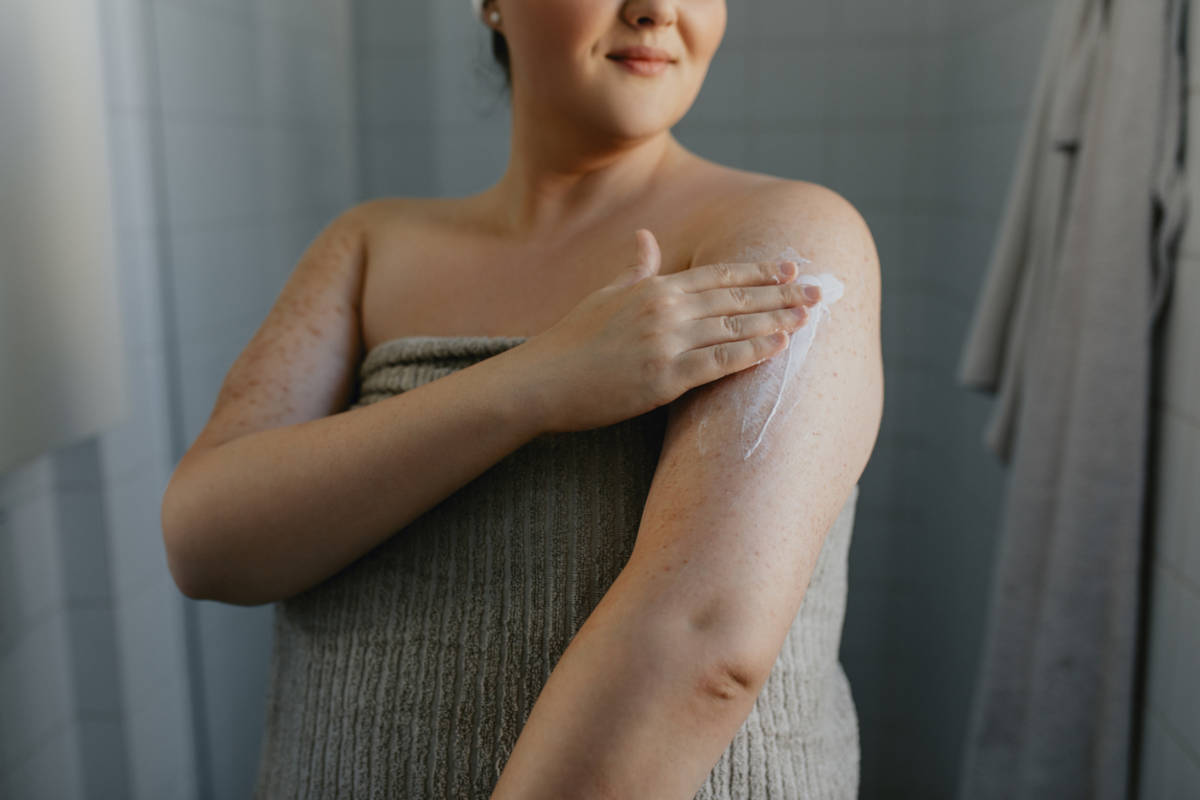Your skin is the most visible marker of your age. If you've always looked after it with a consistent skincare routine, sun protection and a healthy lifestyle, it will stand you in good stead as you age: but it's also never too late to start, says Jocelyn Bailey.
🕒 5 min read
Keeping extrinsic ageing at bay – the kind caused by UV exposure, and environment and lifestyle choices such as smoking, pollution, alcohol, diet, late nights, and stress – is hugely important for your skin's health. Between them, they are the major contributors to earlier and deeper wrinkles, hyperpigmentation and poor texture. In fact, it's been estimated that sunbathing and sunbeds can add 20 years to your complexion, while yo-yo dieting (with repeated skin stretching and sagging) can add ten years, city pollution may add five and stress another three.
It might not be until the age of 60 that chronological, or intrinsic, ageing (which is genetic) will start to show. Intrinsic ageing accounts for some fine lines and collagen loss, but far less than the sources of extrinsic ageing – which means that there is still time to improve your skin health whatever your age.
Skincare in your 40s
Generally, we lose around one per cent of collagen per year, with the first visible signs appearing before the age of 30.
By 40, free radicals caused by poor lifestyle choices are damaging cells faster than skin can repair them, so your face is changing more rapidly. In women, thanks to peri-menopause and falling oestrogen levels, collagen production is declining along with cell turnover, so skin becomes less taut, springy and firm.
Oil production also slows, so your complexion becomes drier, less radiant and supple. Even its colour starts to change, so if you've always coloured your hair, it may no longer suit you so perfectly.
Key changes
Cumulative sun damage and the effects of free radicals are accelerating facial ageing at this time, with fair complexions showing more forehead lines and crows' feet, and darker skins are more prone to age spots.
Collagen loss is causing minor looseness and sagging, with a change to facial definition, while reduced lipids lead to dryness.

Women can counteract lower oestrogen levels with collagen-boosting supplements and moisturiser – don't forget your neck and chest!
Recommended action
Counteract lower levels of oestrogen, which is needed for collagen production and healthy lipid levels, using collagen boosters and hydrating ingredients. Dryness accentuates wrinkles, so moisturiser helps soften them – and don't forget your neck and upper chest.
Lifestyle adjustments still count, so eat more antioxidant-rich foods, get more sleep, try to minimise stress and, if you smoke, stop. If you've been lax about sun protection, you can still minimise future damage. This is also a good moment to start taking collagen supplements.
Your skincare heroes
Choose skincare rich in antioxidants, especially vitamin C, to fight free radicals, repair damage, brighten dullness and rev up collagen.
Slather on SPF50 protection every day with Daily UV Defence SPF50. At night, the Vitamin C Serum has pore-refining, redness-reducing, firming benefits, especially under its partner Vitamin C Face Cream.
For reinforcement, the Platinum Marine Collagen Skin Complex supports skin from the inside.

Platinum Marine Collagen Skin Complex
Premium day and night beauty supplement to support your skin's health from within
- Hydrolysed marine collagen to help slow signs of ageing
- Encourages healthier, more radiant-looking skin
- Selenium and zinc maintain healthy hair; vitamin C protects against environmental damage
Skincare in your 50s
Menopause usually occurs between the ages of 51 and 53, after which the drop in oestrogen makes skin significantly thinner and less elastic. At this point, we need our skincare to work a little harder to keep our skin's freshness and bounce. Pores can also enlarge, age spots may appear and hair can start to thin.
Key changes
In the first five years after menopause, collagen levels can decrease by as much as 30 per cent, resulting in drier, duller and more fragile skin. Deeper folds develop around the forehead, eyes and mouth as underlying fat is lost, potentially leading to jowls. Beneath the eyes, the tear troughs become hollowed. Dryness and hyperpigmentation are becoming issues.
Recommended action
Exfoliation helps increase cell renewal, radiance and smoothness, and the results are immediate. However, exfoliating too firmly or too often can cause redness and sensitivity, so be gentle.
Alternatively, you can boost skin's microcirculation by adding a soft cloth and gentle massaging movements to your cleansing routine. You can also address dryness, sun damage, pigment issues and collagen loss with specialised ingredients.
Your skincare heroes
Start with products that treat general dullness and poor texture such as Skin Brightening Facial Exfoliator, which instantly brightens as well as smoothes. It's also time for the big gun, retinol, although sensitive complexions may need to use it every other night for a couple of weeks until they adjust. Try the Intensive Night Treatment Cream, which contains retinol, hyaluronic acid and vitamin C.
In addition, the Replenish Thickening Caffeine Shampoo & Conditioner supports thinning hair.

Replenish Thickening Caffeine Shampoo
For hair loss and thinning during and after the menopause
- Advanced formula with caffeine and B vitamins
- Helps to thicken and strengthen hair
- AnaGain™ for healthy hair growth and reduced hair strand loss
Skincare in your 60s and beyond
Our 60s are often a great time of life, with a little more time to ourselves and more financial freedom, but it's also time to take your skin's TLC up a notch.
Skin becomes drier still as it thins further, produces fewer natural oils and loses even more water. In fact, skin at age 80 has about 30 per cent of the thickness it had at 18. It sweats less, bruises more easily and heals more slowly. Cheeks are losing more padding, but a soft, velvety complexion is still achievable.
Key changes
Oil production continues to slow as the skin's upper layers struggle to hold on to moisture. Some medications, such as statins and those for blood pressure, can also contribute to dryness. There is bone loss in the lower face contributing to jowls, while the area below your cheekbones and temples may appear sunken. Hyperpigmentation is more pronounced, too.
Recommended action
Concentrate on moisturising and hydration. Soothe dry, itchy skin with short showers rather than luxuriously long baths, and avoid hot, oil-stripping temperatures and apply body lotion straight afterwards.
Occasional exfoliation can still help dullness, dryness and cell renewal since, between the ages of 35 and 80, cell turnover falls by about 50 per cent, with old surface cells clinging on longer and longer.
Your skincare heroes
Go for intense moisturisers and retinol products to improve firmness, elasticity, hydration and wrinkles. Try the skin-plumping Replenish Collagen Boosting Serum under your favourite moisturiser during the day, and the Replenish Intensive Pigmentation Reducing Complex, which contains retinol, phytoestrogens and antioxidants to fight age spots, at night.
Finally, the Replenish Body Butter, with shea butter, cocoa butter and phytoestrogens, is luxuriously soothing and softening for all-over care.







